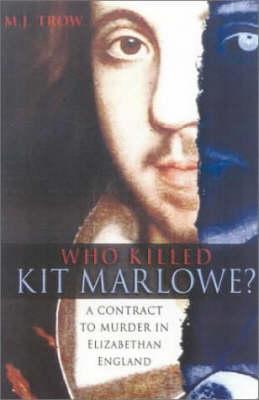Overview
An exploration of the crash-and-burn bard whose wayward life-style and bad-boy reputation led to his death at 29, stabbed through the eye in a tavern brawl in Deptford in 1593. Born the son of a Canterbury shoemaker, Marlowe went on to write ""Tamburlaine"", ""The Jew of Malta"" and ""Doctor Faustus"". He was soon the leading literary light of his generation. But he was also mixed up with political intrigue, spying, witchcraft, alchemy and the School of the Night, and was awaiting trial for atheism when he was killed. The book investigates the conspiracy surrounding Marlowe's death, the subject of conjecture for over 400 years. It proposes that Marlowe was a victim of a contract killing, a desperate measure to prevent him from revealing the names of other atheists including members of the Government and, perhaps, even Lord Burghley himself. There were plenty of motives for Marlowe's death and, in the seething melting pot of Elizabethan England, plots, real and imagined, were everywhere.
Full Product Details
Author: M. J. Trow ,
Taliesin Trow
Publisher: The History Press Ltd
Imprint: Sutton Publishing Ltd
Dimensions:
Width: 15.60cm
, Height: 2.90cm
, Length: 23.40cm
Weight: 0.612kg
ISBN: 9780750926898
ISBN 10: 0750926899
Pages: 288
Publication Date: 21 June 2001
Audience:
General/trade
,
General
Format: Hardback
Publisher's Status: Active
Availability: Temporarily unavailable

The supplier advises that this item is temporarily unavailable. It will be ordered for you and placed on backorder. Once it does come back in stock, we will ship it out to you.
Reviews
Trow is a man with a mission: to investigate the life and death of the Elizabethan dramatist Christopher Marlowe, and disprove the official theory and accrued mythology concerning how and why he was killed, aged only 29, in a mysterious brawl. As a historian and writer of crime novels, Trow is uniquely qualified to conduct such an enquiry, aided, here, by his son Taliesin Trow who has carried out much of the research. He traces Marlowe from his boyhood in Canterbury where he attended the King's School and his years in Cambridge as a scholar of Corpus Christi College. But this is no biography; any accounts given serve to explain the circumstances which embroiled Marlowe in the conspiracies of his dangerous times. When still a scholar Marlowe began to spend more money; Trow asks where that income came from and concludes that, like many 20th-century students after him, the poet had been recruited as an intelligencer - a spy. Elizabeth attempted to find a middle way in religious policy, skirted on the one side by puritans and on the other by scheming Catholics, but by our standards it was not a tolerant one. Drawing a stark picture of late 16th century England, the author gives a detailed description of the tensions caused in an almost totalitarian state by belief in demons, fear of heresy, homicide and witchcraft. Elizabeth's Privy Council had almost unlimited power to torture and a rabid government prised out and punished those, like Kit Marlowe, who dared to be free thinkers. The penalties for atheism and blasphemy were gruesomely cruel. Trow quotes widely from both historians and biographers of the poet and discusses every possible aspect of the murder before coming to his persuasive - and shocking - conclusion. This is a clever and readable piece of historical detection, memorable as much for its vivid evocation of Elizabethan life as for its careful tracing of the events leading up to Marlowe's untimely fate. (Kirkus UK)
Author Information
M.J. Trow is a crime novelist and historian. His novels include the Lestrade series for Macmillan/Constable and the Maxwell series for Hodder. His non-fiction titles includes Let Him Have it Chris - the Murder of Derek Bentley, Constable/Grafton 1989, which reached The Times One Hundred Bestseller List and achieved a pardon for Bentley. Taliesin Trow is currently studying history at Exeter University.



